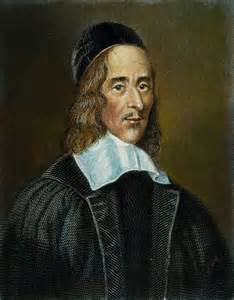Commemoration of George Herbert
On this day the Anglican Church honours George Herbert (1593-1633), politician, orator, priest and poet. Herbert was born in Wales but sent to be educated in England. At Cambridge he was so learned in Latin that he was named the University Orator with the task of delivering speeches of note in that language, such as welcoming King James I who, for a time, became his patron. He sat in Parliament as an M.P. twice but the accession of Charles I seems to have blunted his worldly ambitions. Herbert married Jane Danvers who is said to have fallen in love with him without having met, so esteemed was he by her relatives. Izaak Walton, his biographer, notes that the couple met each other only three days before the wedding “at which time a mutual affection entered into both their hearts, as a Conqueror enters into a surprized City, and made there such Laws and Resolutions, as neither party was able to resist.” He became a priest and spent the last few years of his life as rector of the small parish of Fuggleston St. Peter in Wiltshire where he made a reputation as a faithful servant of his flock.
Today he is revered as one of the greatest of the “metaphysical poets”, a group of 17th century English writers which includes John Donne, Henry Vaughan and Andrew Marvell. Here is one of his most famous works:
Prayer (I)
Prayer the church’s banquet, angel’s age,
God’s breath in man returning to his birth,
The soul in paraphrase, heart in pilgrimage,
The Christian plummet sounding heav’n and earth
Engine against th’ Almighty, sinner’s tow’r,
Reversed thunder, Christ-side-piercing spear,
The six-days world transposing in an hour,
A kind of tune, which all things hear and fear;
Softness, and peace, and joy, and love, and bliss,
Exalted manna, gladness of the best,
Heaven in ordinary, man well drest,
The milky way, the bird of Paradise,
Church-bells beyond the stars heard, the soul’s blood,
The land of spices; something understood.
